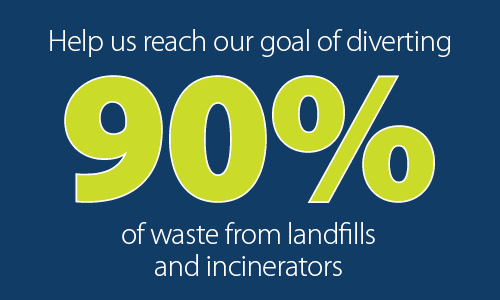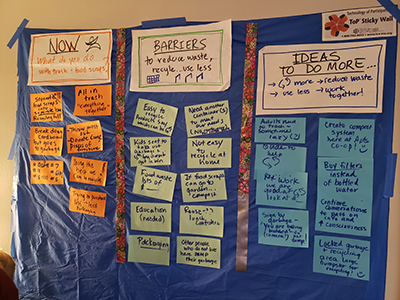|
Mapping a zero-waste future
The county has defined zero waste as preventing 90% or more of all discarded materials from being landfilled or incinerated. The 62 actions in Hennepin County's Zero Waste Plan (PDF) serve as a roadmap to achieve that zero-waste future. Achieving zero waste will require significant changes in the choices we all make in our day-to-day lives and transformative changes in the policies, programs and resources that make up the solid waste system. The climate impact of the stuff we buy and use
We consume a lot of stuff, but the climate impacts of consumption are mostly invisible to the consumer. Creating new products requires energy — to harvest raw material, process it, manufacture it, transport it, and sometimes, to use it. When looking greenhouse gas emissions from the stuff we buy and use, 45% of global emissions are associated with producing and transporting goods. To better understand the climate impact of the stuff we buy and use, Hennepin County is conducting a consumption-based emissions inventory, which estimates the greenhouse gas emissions that result from the purchase of goods and services by Hennepin County consumers. This emissions inventory found that the biggest opportunities to reduce emissions will come from focusing on the following goods and services: vehicles, building materials, appliances and electronics, food, and clothing and textiles. Hennepin County’s Climate Action Plan includes strategies to prevent food waste and compost organic materials, reuse and recycle building materials, shift consumer behaviors to minimize climate impacts of consumer choices, and make policy changes that hold producers responsible for goods accountable and advance zero-waste initiatives. What we heard the community wants in a zero-waste future
The 1.5 year long process to develop the plan was informed by extensive public feedback from more than 1,800 participants, with a strong focus on equity and disparity reduction. The following key findings emerged from all three feedback approaches: Offer more recycling options and create better, more equitable access to services: Recycling and organics recycling services need to be easier and more widely available. A special focus needs to be put on improving recycling service in multifamily settings. Put the responsibility on businesses and producers of materials: Take the responsibility off individuals and require the producers of materials and businesses to create a system that gives residents more options to reduce and recycle, especially when it comes to plastics. Increase education and outreach: People need more clear and consistent information on what is recyclable, what services are available, why recycling is important, and the impact of the materials we throw away. Messages and messengers should be tailored to resonate with specific audiences. Change the cost structure, offer incentives, and invest in community-based solutions: Adjust the cost structure to emphasize recycling over trash and offer incentives that reward good behavior. Pay people to improve recycling and conduct education in their communities and provide funding for neighborhood-based solutions. Invest in zero waste initiatives and act urgently: Taking urgent action to move toward zero waste is broadly supported, but the challenges need to be acknowledged and a significant investment will be required. The project team used these insights and collaborated with county staff, stakeholders, and community members to identify and refine programs, actions, and solutions for inclusion in the Zero Waste Plan. Nearly 150 participants formed action planning work groups where, through four virtual meetings, they learned about community and system needs, heard findings from research, and explored and amended the zero-waste actions. The plan was then drafted and released to the public for comment. Feedback was received from residents and representatives of 24 cities in Hennepin County, advocacy groups, businesses, and state agencies. Changes in the following areas were made to the based on public feedback Providing more education Adding a new action focused on launching a broad consumer campaign on food waste prevention Providing more clarity on a transition to organized collection Expanding advocacy for state laws that advance zero waste and materials circularity Putting greater priority on reuse and repair Acknowledging tensions around the Hennepin Energy Recover Center (HERC) and its role in the solid waste system Next stepsThe county’s waste reduction and recycling staff are now shifting to implementation of the plan’s actions. The county is also developing the next solid waste management plan. |



